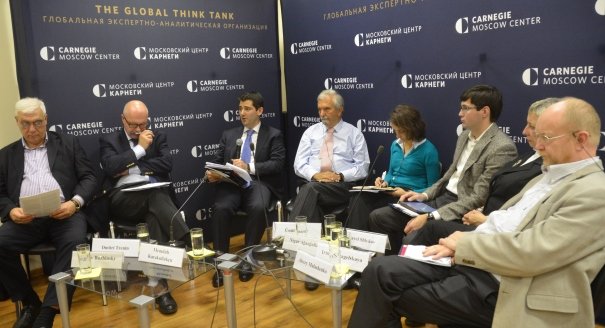Registration
You will receive an email confirming your registration.
Russia and Turkey share many important interests, providing them with opportunities for valuable collaboration and cooperation in their common neighborhood, which stretches from the South Caucasus and the Levant to Central Asia and Afghanistan. In a joint paper Exploring the Prospects for Russian-Turkish Cooperation in a Turbulent Neighborhood released by the Carnegie Moscow Center and the Global Relations Forum (GRF) in Istanbul, a high-level working group on Russian-Turkish regional cooperation offers a forward-looking approach for Russia and Turkey in tackling regional challenges. The Carnegie Moscow Center held a presentation of the paper.
Several working group members from Russia and Turkey were among the speakers, including two project leaders—Carnegie’s Dmitri Trenin and Memduh Karakullukçu, vice chairman and president of the GRF. Other speakers included Nigar Ağaoğulları, GRF director of studies, Ümit Pamir, GRF member and former permanent representative of Turkey to the United Nations and to NATO, Carnegie’s Alexey Malashenko, Evgeny Buzhinsky, former chief of the External Relations Directorate at the Russian Ministry of Defense, Irina Zvyagelskaya of the Russian Academy of Sciences’ Institute of Oriental Studies, and Pavel Shlykov of the Moscow State University’s Institute of Asian and African Studies. Carnegie’s Dmitri Trenin moderated.
Discussion Highlights
- Common Interests: Participants discussed some of the joint interests for Moscow and Ankara. Looking to the economy, Shlykov pointed out that Russia and Turkey have close to 40 billion dollars of bilateral trade, giving them significant economic interests in each other. On security, Karakullukçu argued that the two countries have the potential to serve as anchors of order in a fragile region. Trenin added that one place for security cooperation is in counterterrorism.
- Ukraine: The Ukraine crisis is a complex issue, with potentially severe repercussions, Karakullukçu said. He noted that, although Russia and Turkey have many points in common, Ukraine is still an area of disagreement between them. Pamir added that Turkey favors a solution in Ukraine based on the integrity of Ukrainian sovereignty and international law.
- Crimea: The participants agreed that the Crimean peninsula is very important to Turkey, both economically and with respect to Crimean Tatars, who are a Turkic-speaking people. While Buzhinsky argued that Crimean Tatars are better off now than when Crimea was part of Ukraine, Pamir disagreed, stressing that Tatars are subjected to severe pressures in Crimea, and that Russia’s position is pivotal in this. Malashenko added that Russian authorities must be careful not to repeat in Crimea the mistakes made with regard to Muslims in Russia.
- Islamic State: The participants argued that joint action is needed to combat the threat of the Islamic State. Buzhinsky stated his opinion that Bashar al-Assad’s moderate opponents will not come to power in Syria, adding that realistically Assad is the only viable opponent to the Islamic State in the region. Therefore, Buzhinsky concluded, the Syrian president should be supported against the contagion of the Islamic State.
